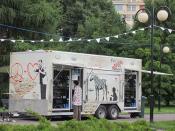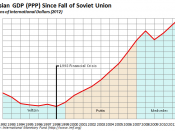Assessing Population Difficulties of Russia
Russia is located in North-Western Eurasia, spanning 10 time zones, and covering over 17m sq kms. Russia was founded in the twelfth century, and throughout the ages was able to expand its territory, gradually conquering neighbouring principalities. Today Russia is the biggest country in the world, which impresses with its cultural diversity and size. (The World Factbook: Russia) Just like any country in the modern world, Russia had its ups and downs throughout the centuries. Unfortunately for this country, the last decades were definitely no the best times in Russian history. Of course, the economic situation of the country will always have a huge effect on the population. Today, the population of Russia is steadily decreasing.
Since the end of communism, in 1991, the population of Russia has not experienced a steady increase. In fact, it has not experienced any increase in the last two decades.
The Russia's population fell by 0.5% in 1999 and could be down 2.8 million by year 2005. Russia's northern regions are the ones who suffered the most - the arctic Chukotka region's population has dropped by 50% over the past decade. ("Russia braces for population disaster") Of course, the population does not drop by itself, and there are a lot of factors that contributed to this dramatical drop. Some of these factors are: poor overall economy in the country (which in turn leads to violence and depression), bad nutrition and health care, and heavy drinking.
The Effect of Economy on Natural Increase.
The collapse of the Soviet Union in 1991 had a tremendous effect on Russian economy. In the privatization years, in the early 1990's, Russia allowed small group of people, who are often called oligarchs, to gain vast interests in the energy and media sectors. As a...



Assessing Population Difficulties of Russia
For some reason, the file wouldn\'t attach. You can find the graph I used (between the 4-th and the 5-th paragraphs) on this web-site:
http://www.usd.edu/~clehmann/pop_prob/ russia/birth_rate.shtml
2 out of 2 people found this comment useful.